You probably read the recent headlines…
- “Coconut oil isn’t healthy. It’s never been healthy” ~ USA Today
- “Nutrition experts warn coconut oil is on par with beef fat, butter” ~ Chicago Tribune
- “This popular health food is worse for you than pork lard” ~ Daily Star
- “Coconut Oil Isn’t As Healthy As We Thought, According To Depressing New Study” ~ Elite Daily
And wondering to yourself “What the heck is going on?”… “I thought coconut oil was healthy”…”Crap, coconut oil is another fake health fad?”
Well you are not alone, it seems the entire Internet freaked out at this “news” and for good reason.
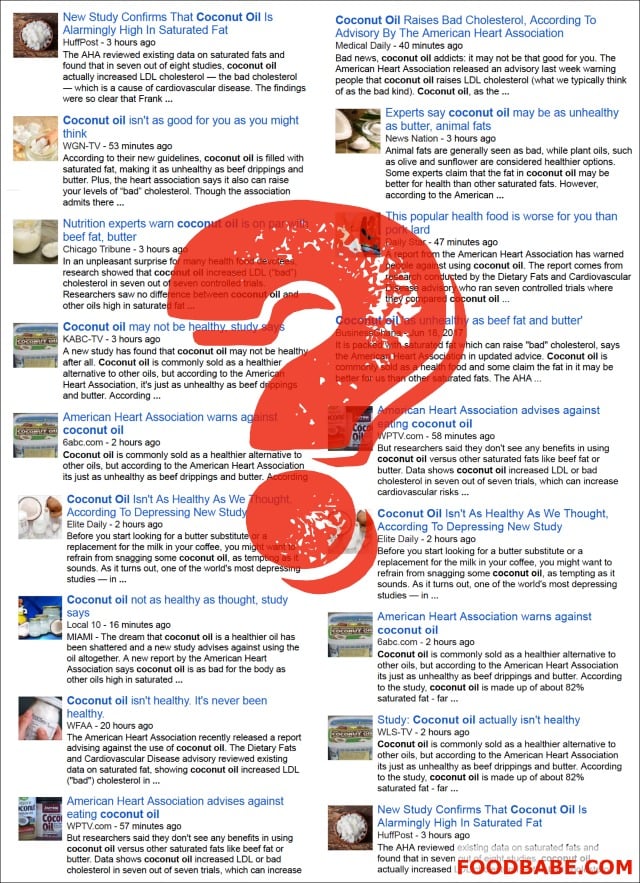
As you can probably imagine, my email and phone has been blowing up about all this – even my Mom sent me a text wondering if it was true. I know it’s frustrating when there is so much conflicting health information being fired at us from all directions. How can we know what to believe? How can we know we’re getting accurate advice? Who should we listen to? How can we expect to get healthy?
It’s no secret that coconut oil is a regular part of my diet and I consider it one of the best oils to consume period. (I even partnered with the top organic coconut oil on the market as a result). Not everyone agrees with me, and that’s fine. But I’d be remiss if I didn’t remind you to all be very careful about health advice reported in the media – because some well-meaning reporters fall for basic industry tricks like this one that has just happened.
When it comes to health information, we must ALWAYS consider the source (and examine it well!)
Even if advice seems to come from a perfectly respectable organization on the surface (like the American Heart Association) – research who they are, who funds their work, and what types of health claims they’ve made in the past. This is something I do when reading health-related articles – and in today’s age of political and industry propaganda and manipulations, it is imperative that you take this step to be your own health advocate.
Who was behind the headlines?
The American Heart Association released a new Presidential Advisory recommending that everyone AVOID coconut oil, stating that it is high in saturated fat and raises “bad” cholesterol levels – which they believe leads to heart disease. In their press release, the lead author of the report recommends that we all stop using coconut oil and cook with “canola, or corn oil or soybean oil, or extra virgin olive oil.” And, he thinks it’s perfectly healthy to deep fry your food… ummm, what?!…
“There’s nothing wrong with deep frying as long as you deep fry in a nice unsaturated vegetable oil” ~ Frank M. Sacks, lead author of American Heart Association’s Presidential Advisory.
Can you trust the American Heart Association with health information?
The American Heart Association (AHA) is the same organization who told us for years to eat margarine (which was notoriously high in trans fat) calling it “more heart-healthy” than butter because it contains “no dietary cholesterol”. They started this recommendation back in the 1960’s and continued it for decades while the primary ingredient in margarine was partially hydrogenated oil full of trans fat. Well, we now know that the trans fat in partially hydrogenated oils are responsible for upwards of 20,000 heart attacks every year – which spurred the FDA to finally ban it from our food (effective in 2018). It’s rare for the FDA to ban anything! Boy, I’d say the AHA was way off on that recommendation, wouldn’t you?
“Of the half million Americans who die prematurely each year from heart disease—the leading cause of death in this country—at least 30,000 are killed by trans fats.” ~ Harvard epidemiologist Walter Willett
AHA certifies food loaded with sugar as heart healthy!
Cans of Bruce’s Yams In Syrup with 18 grams of added sugar per serving, Prego “Heart Smart” Sauces made with added sugar and canola oil, Starkist Ranch Tuna Creations with added sugar and MSG, and Pepperidge Farm Whole Grain Honey Wheat Bread with added sugar, soybean oil, and two additives that contain trans fats (DATEM and monoglycerides) all get their official seal of approval. In the past, they’ve certified Fat-Free Chocolate Milk, Cocoa Puffs, Lucky Charms, and Trix cereal… yikes.
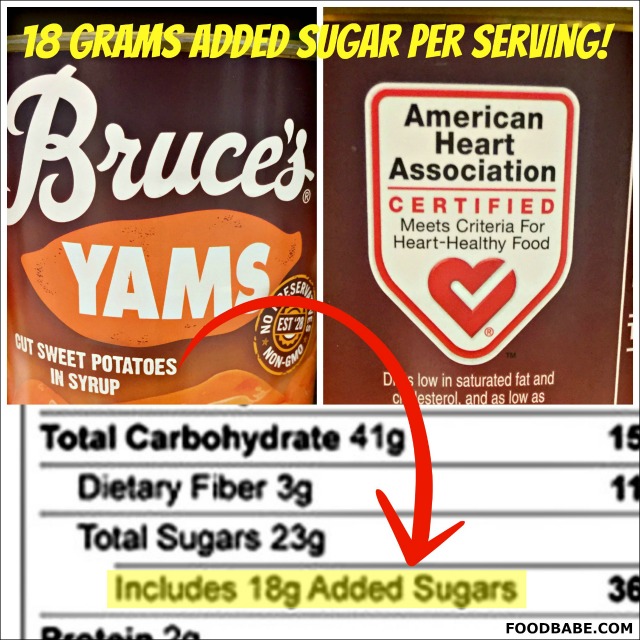
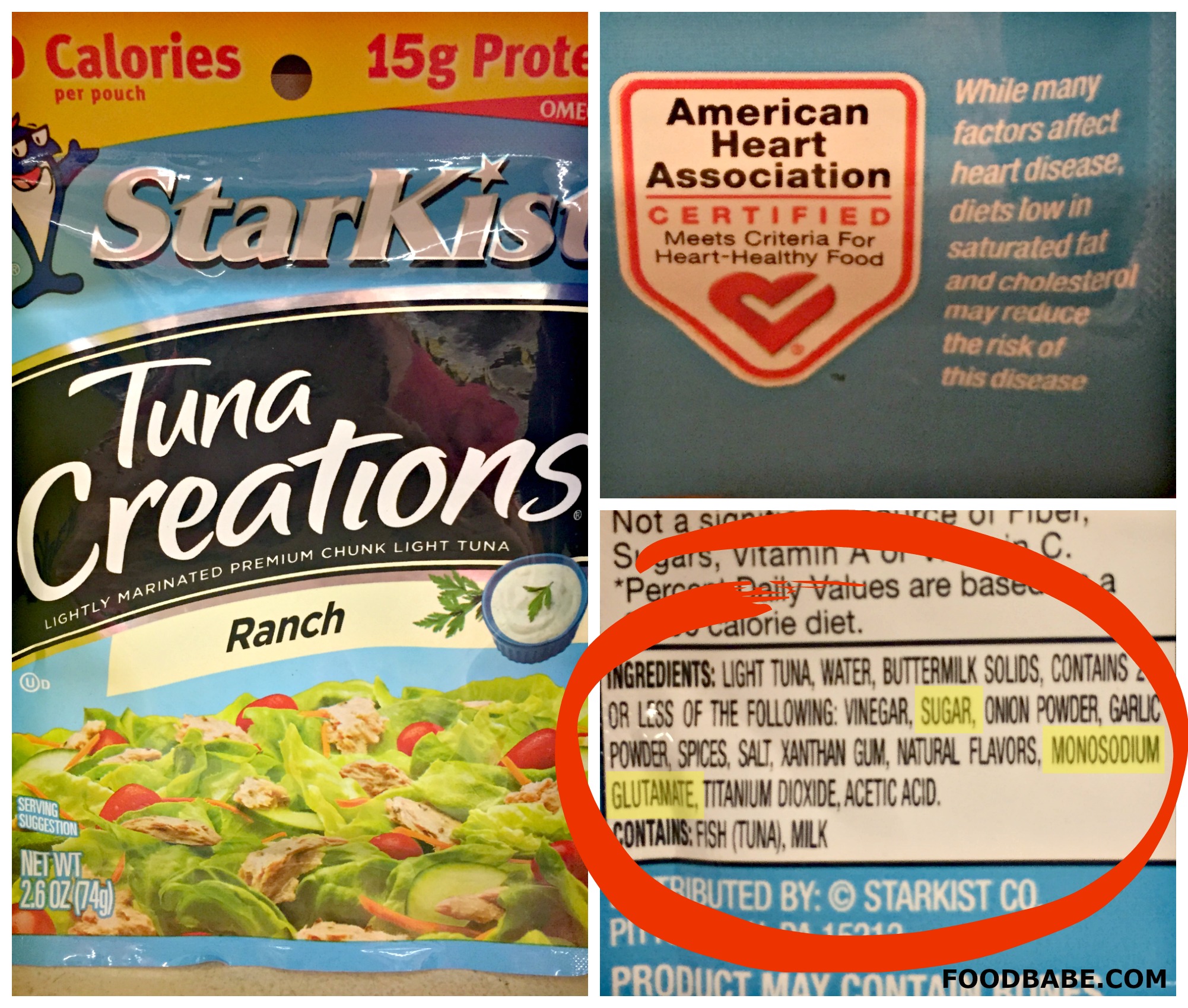
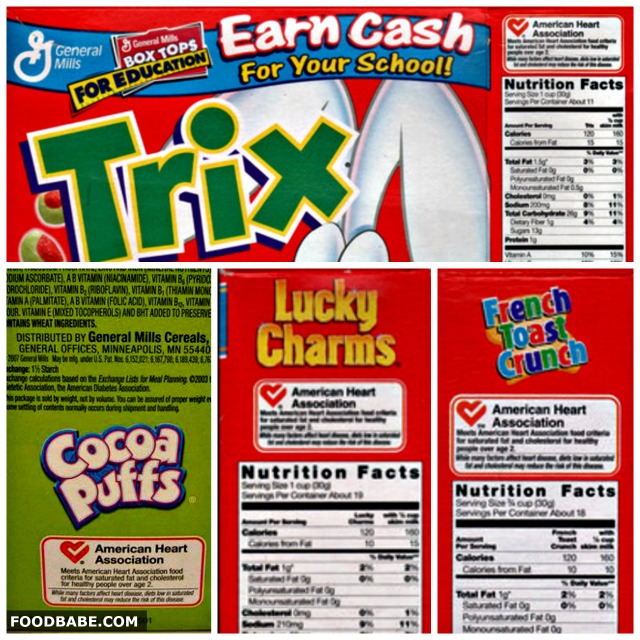
Processed deli meats full of sugar, salt and preservatives (like heavily processed Boar’s Head!) get a big thumbs up from them as well. All of these products and dozens more insanely processed foods with the “American Heart Association Heart Check” Seal of Approval have each paid thousands of dollars in fees (up to $7,500 + annual renewal fees per product) to use the certified seal.
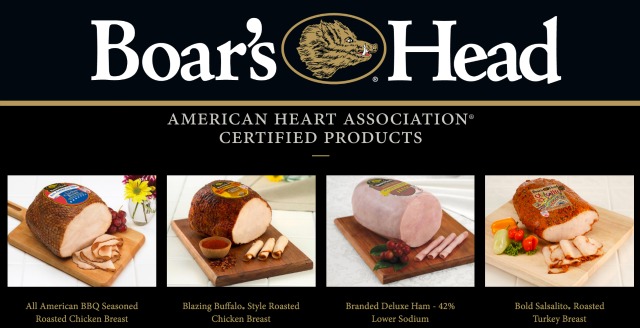
Processed deli meats and sugar are associated with dramatically increasing the risk of heart disease…but the AHA doesn’t call those foods out?
“Researchers from the Harvard School of Public Health (HSPH) have found that eating processed meat, such as bacon, sausage or processed deli meats, was associated with a 42% higher risk of heart disease” – Harvard School of Public Health, May 2010
“Over the course of the 15-year study on added sugar and heart disease, participants who took in 25% or more of their daily calories as sugar were more than twice as likely to die from heart disease as those whose diets included less than 10% added sugar.” – Harvard Medical School, Feb. 2014
They’ve even partnered up with “Healthy Dining Finder” which directs you to eat at Denny’s, Sizzler, and Red Robin… do they really believe these restaurants serve healthy food?
Think of all the people who relied on the AHA’s endorsements and ate foods full of sugar, nitrates, and trans fat for years – and ended up sick as a result. How many people are still being misled? It. Is. Sickening.
AHA and Big Food are longtime best friends!
This is not where the AHA’s ties to industry end. Over the years, their sponsors have included a who’s who list of the worst Big Food brands out there, who fill their foods up with soybean oil, canola oil, processed meats, and sugar:
- Kellogg’s
- Pepsico
- General Mills
- Nestle
- Mars
- Domino’s Pizza
- Kraft
- Subway
- Quaker
The AHA is also raking in upwards of $15 million dollars per year from drug and healthcare companies – including over $3 million from Pfizer (the maker of the statin drug Lipitor that reduces cholesterol). Could this be why the AHA recommends that millions more Americans be prescribed statins, even healthy older people with no history of heart disease? The members of their research committee are raking in industry dollars too… receiving tens of thousands from drug companies to fund research, make trial appearances, and serve as consultants – which is a blatant conflict of interest.
The authors of this new AHA Presidential Advisory that condemns coconut oil are riddled with conflicts of interest as well…
One author, Penny M. Kris-Etherton, discloses significant funding from Ag Canada, Canola Oil Council, and the National Cattlemen’s Beef Association. Could this be why she recommends “lean beef” as “heart healthy” and canola oil as a way to cut belly fat? In the past, she also served on the advisory board at Unilever (maker of I Can’t Believe It’s Not Butter, Country Crock, Brummel & Brown, and Imperial Margarine).
Another author, Jennifer G. Robinson, disclosed research funding from numerous drug companies, many of whom make cholesterol pills… Amarin, Amgen, AstraZeneca (maker of the statin Crestor), Eli Lilly, Glaxo-Smith Kline, Merck, Pfizer, Regeneron/Sanofi, and Takeda.
Various conflict of interest disclosures reveal that Frank M. Sacks (lead author) has been paid by the industry to testify in court cases involving POM Wonderful, Hershey, Unilever, and Keebler. He also testified for or has received consulting fees from several drug companies including Abbott, Amgen, Eli Lilly, Merck, Roche, Sanofi and has received lecture fees from AstraZeneca. These previous associations were not disclosed as conflicts in the AHA’s report, but I consider this significant, don’t you?

The AHA’s ties to the industry shouldn’t be ignored.
It’s important to recognize squarely where the AHA’s loyalty lies. They are protecting industries from which they receive millions of dollars. When their primary sources of revenue come from Big Food and Pharmaceutical companies, you’ve got to question the veracity of their opinions on what constitutes healthy food.
Is saturated fat really the enemy?
The AHA’s recent statement on the saturated fat in coconut oil is NOTHING NEW coming from them. They have long held the position that processed vegetable oils (like canola, corn, soybean oils) are healthy and discredit any information to the contrary, while demonizing all saturated fats as detrimental to our health.
This belief has persisted thanks to intense influence and lobbying by the Institute for Shortening and Edible Oils (ISEO), an industry trade group that protects the interests of vegetable oil manufacturers like Cargill, Bunge, and ConAgra.
“As far back as 1968, the ISEO was mentioned in an internal memo written by the medical director of the American Heart Association: According to the memo, the ISEO objected to the AHA’s intention to include a warning about trans fats in its dietary guidelines; subsequently, the AHA took it out.” ~ Mother Jones, August 2012
Furthering this belief, in the 1960’s the sugar industry funded research that would hide the link between sugar consumption and heart disease, while promoting the idea that fat is the real culprit. The public didn’t find out the truth until internal sugar industry documents were released in 2016.
Many health experts believe saturated fats DO NOT cause heart disease and may even be GOOD for you.
There is well documented evidence that saturated fats do not increase your risk of heart disease. A recent meta-analysis in the British Journal of Medicine came to this conclusion. Another meta-analysis of 21 studies published in the American Journal of Clinical Nutrition has also come to this conclusion. Another meta-analysis published in 2017 found that replacing saturated fats with polyunsaturated fats (like corn oil) is not likely to reduce risk of heart disease. I could go on and on and on and on.
A 2015 study published in the American Journal of Clinical Nutrition found that saturated fats may increase risk of heart disease, but NOT if they come from fish, dairy, or plants – such as coconuts! If you look at the countries that consume the most coconut oil, they’ve also got the some of the lowest rates of heart disease… what does that tell you?
“For many years we have been told that to prevent cardiovascular disease (CVD), we must lower our intake of saturated fatty acids (SFAs) and instead eat more carbohydrates and polyunsaturated fatty acids (PUFAs). Backed up by the National Cholesterol Education Program, the National Institutes of Health, and the American Heart Association, the medical profession has promoted this idea eagerly, although the number of contradictory scientific reports is almost endless. There is in fact much evidence that doing the opposite is more relevant… There is no evidence that a lower intake of SFA can prevent CVD and a high intake of PUFAs without specification may result in a high intake of omega-6, which is associated with many adverse health effects. Because there is much evidence that saturated fat may even be beneficial, we urge the American Heart Association…to consider the aforementioned evidence when updating their future guidelines”. ~ The Questionable Benefits of Exchanging Saturated Fat With Polyunsaturated Fat, Mayo Clinic Proceedings, April 2014
If the AHA truly believes saturated fat is so bad, why do they have “heart healthy” recipes for beef and pork on their website, given these are the biggest sources of saturated fat in the American diet? Could it be because the National Cattlemen’s Beef Association, the National Pork Board, Tyson, Hormel, and Smithfield have all paid money to have their meats and recipes “heart check” certified? This sure raises my eyebrows.
Cholesterol has been demonized, but wrongly so.
We now know that cholesterol does some amazing things for your body and isn’t all bad as once believed – but it’s highly complex. Even if coconut oil raises cholesterol levels, this doesn’t tell you the whole story. According to Dr. Mark Hyman, what you want to watch out for is the type of cholesterol that is getting raised and particle size, along with high triglycerides:
“As a doctor, I tell patients that abnormal cholesterol can become a problem when it is the small dense LDL particles, accompanied by high triglycerides. In fact small LDL particles actually triple your risk of heart disease. This is caused by high-carb, low-fat diets and is improved when you add fat back to the diet, including saturated fat.” ~ Is Coconut Oil Bad for Your Cholesterol? Mark Hyman, M.D.
It’s also been shown that saturated fat in coconut oil increases “good” HDL cholesterol and increases the size of LDL particles (making them less likely to promote heart disease). On the other hand, low cholesterol can be harmful, linked to increased risk of cancer, Alzheimer’s disease, dementia, and morbid depression.
What you really should be avoiding are refined “vegetable oils” like corn, soybean, and canola oil…
These oils go through an insane amount of processing with chemical solvents, steamers, neutralizers, de-waxers, bleach and deodorizers before they end up in the bottle. Corn and soybean oil are very high in omega-6 fatty acids which are known to promote inflammation in the body. Chronic inflammation is a real killer, increasing the risk of heart disease, type 2 diabetes, and Alzheimer’s disease. These oils are also strongly linked to cancer and are typically derived from GMO crops contaminated with Roundup herbicide.
Despite all the evidence against it, the American Heart Association continues to tell people to eat these highly processed, inflammatory oils. Why is this?
It could be that the AHA is just stuck in the 50’s and can’t come to grips with all the new research out there. But I have another theory which seems more plausible – the AHA is protecting the profits of the drug industry (their sponsors) who rely on us being unhealthy enough to need a prescription and the food industry who prefers to use cheap oils in their food and doesn’t want to spend more money for healthy ingredients. It’s all about the bottom line.
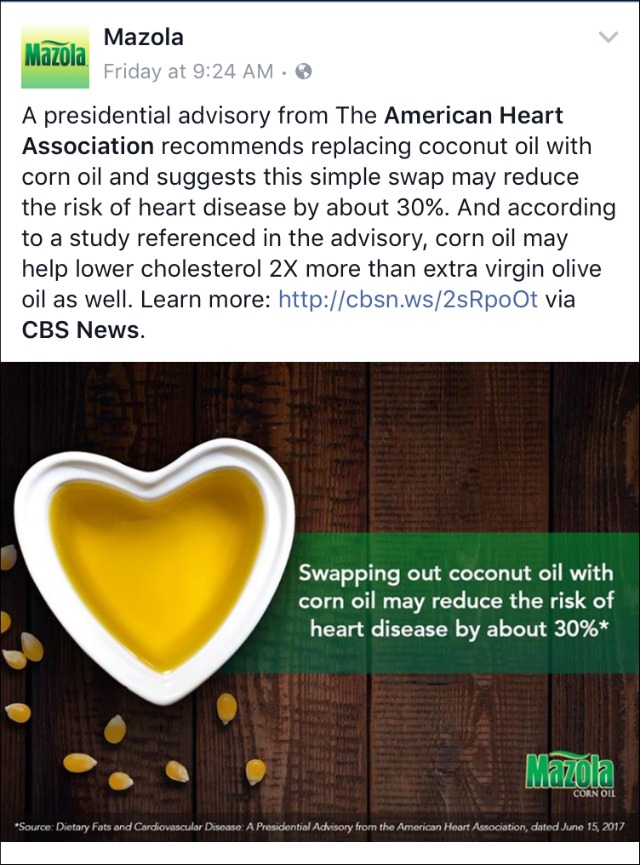
It’s really no surprise that the AHA is trying to vilify coconut oil.
Now that the general public is learning the truth about saturated fats and sugar, the industry is freaking out. They needed to find a new angle. They need to win their way back into the public’s hearts… and what better way to do it than to scare us… “Hey, you know that coconut oil in your cabinet that you thought was healthy? Well, it’s going to give you a heart attack”.
It’s so outrageous for them to make this claim when you look at where we are today with our health.
For someone to die from a heart attack was virtually unheard of 100 years ago, it was extremely rare! In just a few short decades it became the leading cause of death in the ‘50’s and now heart disease remains as the #1 killer of Americans. The drugs pumped out by pharmaceutical companies and all those new “trans fat free” foods are doing nothing to stop this. What changed so dramatically during the last hundred years?
One of the most significant changes to our diets was the switch from natural fats to processed and refined vegetable oils. Americans moved away from eating real butter and fresh foods, while increasing consumption of sugary processed foods made with vegetable oils. Data shows that in the last several decades Americans cut the fat from their diets by 25% while increasing intake of carbohydrates by more than 30%. The majority of these carbohydrates aren’t healthy fruits and vegetables either – but mostly refined breads, crackers, cereals, pastas, and other low-fat processed foods packed with added sugar.
Where has cutting out the fat and gorging on refined grains and sugar gotten us? If you ask me, the health of our nation has tanked. It makes me incredibly sad, because I know most people are trying to eat right and do what their doctors and experts from organizations like the AHA tell them to do. No one wants to be overweight and sick, yet that is the reality for most Americans.
I personally love coconut oil and all of the health benefits it provides.
The tropical saturated fat in coconut oil contains medium-chain triglycerides (MCT), which have been shown to increase your metabolism and to REDUCE body fat (sources: 1, 2, 3, 4), while retaining muscle mass. It works to bring down chronic inflammation in the body and is an amazing source of energy. As a bonus, it’s also associated with increased antioxidant levels in the body that can slow aging!
I use a variety of cooking oils in my kitchen. Read my investigation with a list of which oils I personally like to use here. If you know anyone who is wondering if coconut oil is dangerous (or is trusting the American Heart Association for health information), please share this post with them and keep spreading the truth!
The debate continues…
Even two members of my Advisory Council, who are both physicians that I greatly respect, are on opposite sides of this issue and do not agree. Dr. Joel Kahn agrees with the American Heart Association’s conclusions (because he is generally against all oils) and Dr. Mark Hyman does not…
“My advice is to not get lost in the jungle of discussion over coconut and its oil. Without a doubt the AHA Advisors were responsible in highlighting the lack of data for a health benefit to adding coconut oil to the diet and the likely risks”. ~ Joel Kahn, M.D.
“First, there is not a single study showing that coconut oil causes heart disease. Not one. Second, the whole case against coconut oil is founded on a hypothesis that has been proven wrong”. ~ Mark Hyman, M.D.
I greatly appreciate this difference of opinion, and of course, I have my own.
What do you think? Let me know in the comments and please share this post with your coconut oil loving friends!
Xo,
Vani





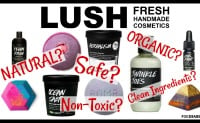


I just want to say thanks for standing up against the big old ways. That’s it. Just Thanks!
Me too! Thank you for standing up against Big Pharma, the corrupt medical industry, and the corrupt bureaucracy! Use colloidal silver! Use coconut oil! Use whole foods!
I just bought a bottle of CBD oil and a big jug of Lou Anna coconut oil and have been drinking coconut and almond milk on the advice of my chiropractor for years. Of course you’re right! And don’t forget the about the payoffs to the FDA!
Big Pharma & Big Food do not want us healthy, AHA is as crooked as all of the other give me money organizations. Cancer is caused by the processed oils (soy, canola, corn) and are probably 100% GMO, canola oil damages red blood cells & possibly can give you leukemia , so toxic when growing insects will not touch it!, soy is poisonous also when growing, the Japanese ferment it to make soy sauce, only safe way to consume it, downside, soy wrecks hormones, turning men into women, damages immune system also,and it is found in every thing you eat, eggs, meat, bread, candy, drinks, ect., corn oil is 100 % GMO, HFCS is another man made chemical that causes diabetes, body cannot digest it, pancreas shuts down, now on way to being diabetic! The American people & now most of the world is being poisoned slowly with food and drink, I read the ingredient list on foreign foods imported that are found in stores like Aldi’s, Big lots, Walmart, they also use HFCS, & Soy ingredients , buy organic, cook what you eat, and know what you eat!
Book “Big Fat Surprise” by Nina Teicholz covers this including bogus veg oils, trans fats and industry influence on gov’t recommendations. Profits vs science.
I truly believe that. they don’t want us healthy they want people to be sick so they can still sell Pharmaceutical drugs. The beauty industry is the same way. Just like they say is more arsenic inn instant coffee then the coffee that you put in a coffee maker. my grandmother been drinking instant coffee for over 50 years and she almost a hundred years old and she doesnt have cancer for drinking instant coffee..
Please comment about the taste of grass-fed, free-range meats. I have found them to have an “old” taste and be tough.
First, grass-fed beef is not the same as free range.
Also, not all grass-fed beef is equal. If the cattle are raised right, the beef is gourmet. It seems you
have sampled meat from operations that are not following best practices for grass-fed beef.
Or is Angela just batting for the AHA and the rest of the “official” crooks.
Oil is oil. Olive oil used to be considered a health food because someone noticed that the people on the island of Crete were very healthy and they ate a lot of olive oil. They also walked an average of 9 miles to the fields to work each day, ate some fish, and very little meat and almost no sugar. They ignored the exercise and diet and determined Olive oil as healthy.
The same thing is happening with coconut oil. Everyone ignores the fact that it is so high in saturated fat by saying stuff like “tropical saturated fat in coconut oil contains medium-chain triglycerides (MCT), which have been shown to increase your metabolism”. If it does, that is good because it also increases your caloric intake by a bunch. All oils contain about 120 calories per tablespoon. You can turn a healthy 100 calorie garden salad into an unhealthy garden salad by adding any oil.
There are no vitamins or minerals in oils, even coconut oil. Therefore it is just empty calories. If it was a health food you could just eat as much as you want with no consequences. I wouldn’t recommend it.
I will concede that it is probably far healthier than beef fat, soy or corn oil. That is not saying much.
The brain needs healthy fat. Look it up.
You are right. Fry your turkey with engine oil and enjoy.
Steve, Why didn’t you point to any study when you say, “no vitamin, minerals in Coconut oil?” WRONG, Read a study:
The British Journal of Nutrition 2015, entitled:
The Role of Dietary Coconut for the prevention and treatment of Alzheimer’s: Potential Mechanisms of Action.
The development of AD has been linked to oxidative stress.
• Studies have suggested that antioxidant-rich natural diets may protect against AD.
• Coconut oil has a high percentage of PHENOLICS/ phytochemicals.
–
• The hydroxyl group of phenolic compounds may be able to reduce the toxicity of Alzheimer’s AB Peptide *114-118).
• In vitro studies that have investigated flavonoids indicate that the hydroxyl groups could trap hydrogen bonds of AB, which is important as this may reduce AB aggregation(114). It has also been shown that phenolic compounds can bind AB fibrils (119),
Several other phenolic compounds have been shown to prevent AB aggregation and/or toxicity such a resveratrol, catechin, curcumin(120,121).
Ferulic acid is a phenolic compound; Potent antioxidant, anti-inflammatory.
Strong anti-AB aggregation properties (126)
Researchers have found that the chronic administration of ferulic acid can reduce cortical levels of AB1-40 and AB1-42 , in transgenic mice(127),
shown to inhibit AB deposition in the brain (127).
Suppressing the increase in glial fibrially acid protein;
shown in mouse studies after long-term administration of Ferulic acids.
Another compound in coconut oil, p-Coumaric acid, has high antioxidant capacity(131).
– Maltolyl p-coumarate has been found to attenuate cognitive deficits in rat models.
– AND to cause a reduction in apoptotic cell death in the hippocampus of, Ab1-42 infused rats.
ALL THESE STUDIES HAVE SUGGESTED THAT COCONUT OIL CONTAINS MANY ANTIOXIDANTS WITH THE POTENTIAL TO REDUCE THE DEVELOPMENT OF AD PATHOLOGY.
COCONUT OIL on Insulin resistance and control of plasma lipids
Recent studies have shown that including coconut oil in the diet can reduce the risk of these factors:
1. Insulin resistance,
2. CVD,
3. disrupted cholesterol metabolism,
4. type 2 diabetes
5. and hypertension.
Researchers have observed that a diet rich in coconut oil shields against Insulin Resistance in diabetic rats(137).
In contrast, rats fed with MCFA (from coconut oil) had reduced carbohydrate response element binding protein and LCFA elongase-6 expression.
Importantly, had IMPROVED isulin signalling and less IR.
Those, like me, with autoimmune kidney disease, can really benefit from both the extra calories in Coconut oil and the fact that the that kidneys are fatty organs and have been shown in studies to benefit from Coconut Oil. So remember: one man’s meat…
It seems you didn’t read the article properly. Also be aware that there is much more to nutrition than vitamins and minerals.
Your view that all oils are the same and that they are all unhealthy is arrant nonsens. Try living on 100 calorie salads and see how long you last.
My concern is with those of us with gastroparesis that must curtail our fat intake drastically. Does coconut oil delay digestion like soy?
I’m not sure where you got the idea of something being a ‘health food’ meaning you can eat as much as you want with no consequences. Too much of ANYTHING can do harm to your body, even water.
Saying oil is oil is like saying vegetables are vegetables. Stupid and uninformed.
This article was incredible. The AHA is completely exposed. Great job Vani
100%
I’m a FNP and have used and told people to use coconut oil for several years. The basic measure is does an oil raise or lower C reactive protein which is a marker for inflammation. Coconut oil lowers. Olive oil (omega 9) is neutral. Rice bran oil lowers as does fish oil. Corn/vegetable oil raises and should never be used. Coconut oil is also the best treatment for adolescent acne. It kills the bacteria that cause acne. It also is just as effective killing vaginal yeast infections when compared to Diflucan. It also is converted to ketobodies (the point of the Atkins diet) and keto bodies are an alternative fuel source for brain cells so delays progression of dementia.
Oh, to kill acne you have to ingest the oil. Coconut oil is special as the molecules are so small they do not require bile to be absorbed. They basically just ‘diffuse’ unchanged from the gut. They are also likely protective for the environment of the bowel and decrease chances of getting C. Dif. Totally safe. Do not believe the propaganda.
TRUTH. Indeed, I read Dr. Bruce Fife’s book The Coconut Miracle”. Everything he stated, which is similar to your facts, was based on 176 referenced reviews.
Nothing can touch the MTCs in Coconut oil, of which the liver converts to ketones, a Clean and preferred fuel for the brain. Especially in elderly where insulin resistance causes glucose ineffective to reach the brain for fuel, which takes 20% of calories consumed in 1 day.
Please research coconut oil and its effects on raising estrogen and progesterone levels. Many women are concerned about estrogen positive and progesterone positive breast cancers. Additional info regarding how to LOWER these hormones is appreciated.
And what do the phytoestrogens in soy do for your hormones?
Please consider reading all of the books authored by: Dr. Bruce Fife, he is the world’s leading expert on coconut and health. He is the director of the Coconut Research Center, a nonprofit organization dedicated to educating the public and the scientific community on the nutritional and health benefits of coconut. He is the author of numerous books including “The Coconut Oil Miracle”. Another of my favorites by Dr. Bruce Fife’s is: “Coconut Cures”!
I’ve never seen a developed country where the average man is so ignorant about food and health such America.
Americans are overweight/obese animals, totally under the control of big food and pharma lobbies: eat junk, be sick, eat pills till you die. Disgusting.
I believe it’s because we’re used to having an “easy” life, eating & drinking what we want whenever we want it. Laziness. I’m talking about myself primarily. I’m working on getting healthy again, getting rid of the meds, and getting my life back. It’s my own fault for not being more responsible with my eating.
it is not only your fault, it is also the food industries fault, they want to make you believe it is your fault, so nobody points at them promoting junk food. the main problem is that the aisles in the supermarket are full off food that has been modified to a point where there is close to no vitamins, minerals and fiber in the food. if you eat this food, you gain weight because your body signals your brain it needs more of the actual required nutrients that are not in this empty food which just has lots of sugar and fats and salt. the answer to the food problems is to simply eat more natural foods: vegetables, beans, whole grains, nuts and fruits and drink water instead of soft drinks and juices.
I do believe that the controversy will continue to march on. It was not too long ago that Dr. Hyman stated his disapproval for coconut oil, incorrectly stating the low % of MCT in coconut oil. He now is a big fan. He also considers lamb stew to be a detoxifying meal. What?!! Look at the search done by Dr. Michael Greger. He is most definitely not a fan of coconut oil. The lipoprotein A/B test is just not widely done, so most people have no idea whether their cholesterol is fluffy or tiny and dense. In addition, these amounts are typically small and we do not need to eat shovel fulls of fat anyway. Dr. Perlmutter recommends a fat intake of up to 70%. Is that how you want to eat? I don’t think so. You did a good job informing and confusing us at the same time. Thanks.
When it comes to causing confusion you are out on your own.
Fantastic article! Keep up the good work!
All your article did was discuss the short comings of the food industry, and it seems you have a conflict of interest to support coconut oil. As a biologist I prefer to read scientific articles and there is only evidence that coconut oil does cause heart disease. The health fad started after one scientific article reported positive finds regarding coconut oil, but it was about one specific type of coconut oil that is not readily available and these finds have not been replicated – the author has even come out and apologized, saying she never meant her findings to be misconstrued and exaggerated fueling this very unhealthy fad.
Marco, you did not mention what country you’re from,…!
Hopefully you aren’t eating GMOS food packed with sugar, sugar derivatives, unhealthy oils and soy. Sometimes it feels like a losing battle but that’s why we’re here learning from Vani how to be and stay healthy in spite of the foods that have been manipulated to create a hunger, overeat and be unhealthy. It can be a bit tricky considering what we have to work with in the states. Now they’re putting cannabis oil in our food and drinks, so if you think we’re big now, wait till we get the munchies! ; ]
Our government is the most crooked organization in the world, and they are destroying the world. Sad to say because I’m an American and it’s just sad.
I too am a big fan of coconut oil and have been studying its benefits for many years. A good quality, virgin coconut oil that is cold-pressed or centrifuged offers tons of health benefits.
It is very clear that the AHA has their own interests. However -and this is very important- there is a HUGE difference in quality when it comes to coconut oil.
There are no real regulations and brands can basically put any claim on their label. A lot of the coconut oils that are being sold as virgin and organic are in reality highly processed refined oils that have been chemically altered. If you would look into the types of coconuts that are used for these poor quality oils, it would truly shock you, as they are often full with mold and fungi.
Private labeling makes it also challenging to trace the origins of an oil, but there are some ways to find out what quality of coconut oil you are buying, by analyzing the color and texture in the bottom of the jar and a few other things. The price also says a lot about it, although it’s not always a guarantee. And always contact the producer to ask how an oil was made!
I explain what to pay attention to when it comes to choosing a good quality coconut oil. You can find the article by clicking on my name.
Curious to hear your thoughts about it Vani!
All the best,
Erika
I am so grateful for this article.it is very time-consuming to look into the credentials and the influencers behind authors and organizations and I really appreciate you being very clear about who is sponsoring the research who is sponsoring or supporting certain organizations that are making such bold statements.
I really believe that a lot of so-called health information is primarily advertising for products. I remember stories of certain agricultural Farmers having some money issues and the government actually encouraging people to consume those products with so-called health information. That memory is 20 or 30 years old so I don’t remember the specifics.
but in addition to that I really find it interesting all of the negative things that the pharmaceutical companies are doing and this is an example of them actually funding research to encourage unhealthy things for people to consume as if they are more healthy so that people would be more reliant on the medications.
In mental health this is happening right and left we are medicating way too many people with antidepressants and anti-anxiety medications and not getting to the root of a lot of the problems that they’re having.and people don’t realize that there are side effects to coming off those medications that can look like increased mental illness and people are caught in the cycle of it.
your article causes me to think about the cycle of being encouraged to eat certain foods that are not probably healthy for everyone to be eating and then they need medication because they got out of balance and that medication encourages that you not consumer that you do conserve other foods that mean else will not be healthy and therefore you need more medication.
I don’t personally follow a paleo diet I am an omnivore but I really believe that the paleo diet is a very healthy one and is well supported by research. I don’t follow it because I can’t afford to eat that diet. But I am leaning more toward that to the extent that I can afford. I’m also not willing to give up certain foods that I still enjoy.
I just make it a point to not pay attention to any advice from the government about what I should be eating or any advertisements about one food being unhealthy and another food not being healthy.
You can’t really depend on anyone to monitor your health. There are certain things we can be sure are terrible in the diet and we can avoid those. The jury will be in and out on everything else and it’s up to the individual to moderate, adjust and live accordingly to how certain foods make us feel. Geezus, try not to make it rocket science. Lots of raw organic food, and high quality fats such as avocado, nuts and seeds, etc.. A tablespoon (is all we need) of an oil like coconut or EVOO or avocado can help us and certainly won’t bring on disease. I don’t buy all the hype.
This has been my philosophy for over 50 years and I have not been sick a day in my life. I run five miles a day, seven days a week, unless it’s pouring rain, walk during my job another five miles a day and “sit” down only to sleep. My diet helps me maintain this kind of energy. So very simple !!!
I found the comment by Mazola oil kinda funny and ironic to say the least.. If you consider the connections it has to the Weston family. For those who don’t know, Mazola is owned by the ACH group which is a wholly owned subsidary of Associated British Foods which in turn is owned by the Westons who also own Loblaws and guess what? Loblaws has their own brand of coconut oil. There is the President’s Choice Coconut oil and PC Organic Coconut oil which is a store brand of Loblaws.
Great information. I appreciated it very much. Thanks for posting.
I love all the things you’re doing and teaching us. It’s all very helpful. However, I do have an issue with the foodbabe website, and how difficult it is to search for anything. No matter what I put into your search I end up with something unrelated to my search. Thank you Vani for all you do!
Nice article!
I came to understand that coconut has many benefits for humans / Did you know that coconut shells can help to treat wastewater? check here: http://fst.unair.ac.id/en/olah-air-limbah-through-batok-kelapa/
thanks for sharing!
This is certainly an interesting take on the controversy. As with any kind of saturated fats, it is all about moderation. Overall, you should only be consuming around 13 grams of fat a day, if you are following a 2000 calorie diet. So, as long as your coconut oil consumption fits in with this limit, you should be fine!